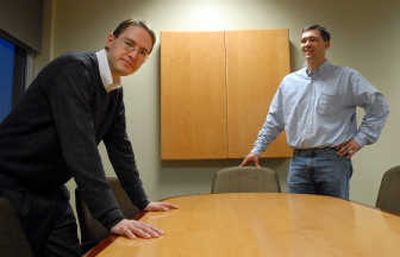GU providing patent aid

A new partnership offers regional high-tech startups free or reduced-cost legal help in protecting perhaps their most valuable assets: their intellectual property.
Since this fall, four Gonzaga University School of Law students have helped clients of Spokane business incubator Sirti guard their technology and business interests under the guidance of local patent attorneys. The program helps secure the success of the small companies, provides students hands-on experience and gives patent attorneys a chance to give back, proponents said.
The majority of Sirti clients hadn’t pursued patents because “they just couldn’t afford to,” said Mike Urso, Sirti’s senior principal consultant.
“Securing the legal rights to their ideas is essential,” said Gonzaga law professor Rosanna Peterson. “And yet intellectual property legal service is not cheap, in part because IP attorneys generally need a science background.”
Sirti clients in early development stages will receive free assistance, while those with limited incomes or solid financial backing will get reduced rates.
Students handle research and filings, either on a for-credit basis through the law school’s externship program or by volunteering on their own time. All are overseen by patent attorneys from law firms Lee & Hayes and K & L Gates.
Lee & Hayes hired the first two participating students: Dominic Lindauer, who helped Spokane startup EnergeticX, and Jacob Scott, who assisted Gibby Media Group Inc.
“The experience has been invaluable, because I’m out there working directly with the client under the tutelage of an attorney, and I’m able to spot issues that arise and crop up, and that’s fun,” said Scott, 28. “It’s better than reading in a book.”
Practicing patent law requires a technical degree, a license from the U.S. Patent and Trademark Office and passing the state bar exam.
Lindauer, now a patent agent for Lee & Hayes, has an undergraduate degree in physics from Eastern Washington University, while Scott, expected to become a law clerk for the firm next year, received a mechanical engineering degree from the University of Utah.
One client had suggested a “patent pool,” or group of businesses cross-licensing patents related to particular technology, but Sirti couldn’t find the right model, Urso said. Then Lindauer this spring approached Urso about volunteering, eventually sparking the program.
Urso envisions expanding it to additional firms, and adding three to five more students next year.
“It’s hitting a very nice ignition point,” said Lindauer, 33.Lindauer filed for U.S. and international patents relating to technology of EnergeticX, a developing company focused on “green, intelligent micrologistics” for businesses and consumers, which involves both software and systems. He worked to file a patent in about a month instead of the typical five or six required, he said.
“For us, it’s a low-cost opportunity with, I think, a very high-performance law department and legal assistance,” said EnergeticX founder Mark Russell. “The company, specifically, is in a state of development, so cash is always king. More importantly, they’ve done really great work.”
Applying for patents normally could cost $10,000 to $15,000 each, depending on the scope, Russell said.
At Gibby Media, Scott said, he started by teaching about intellectual property and identifying things he could help the firm protect. He later filed for five trademarks and a patent relating to the company’s GibbyDisc technology. He also reworked multiple agreements and contracts.
“It was a good learning experience for all of us, but daunting in the fact that it takes a lot of cooperation between the inventors (and) the attorneys to get everything done,” Scott said. “And it’s kind of a disruptive thing for the business, because they’re used to doing business all the time and not explaining to attorneys their technology.”
The program “solves a huge problem and enhances a technology company’s opportunity for long-term success,” Gibby Media CEO and President Lon Gibby said in a prepared statement.
3-D online mapping tool provider GeoData Technologies, of Sandpoint, and all-terrain skate company GateSkate Inc., of Richland, Wash., also have received assistance.
“It’s just good to help high-tech companies in this area and help protect their assets,” said Shirley Anderson, a patent attorney with Lee & Hayes who supervised Lindauer.